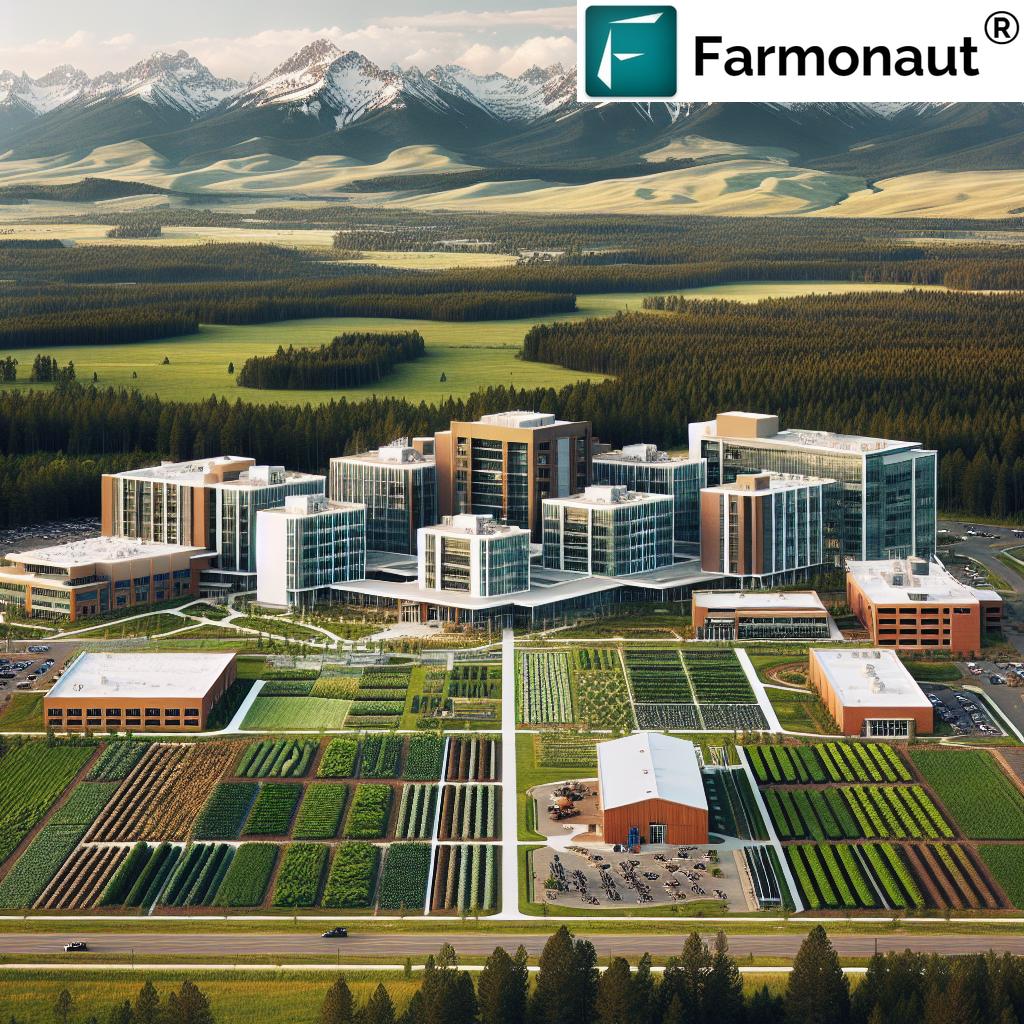Montana State University Ranks Among Top Global Institutions for Agriculture & Forestry Studies
“Montana State University’s agriculture program ranks among the top 350-400 institutions globally in the QS World University Rankings by Subject.”
We are thrilled to announce that Montana State University (MSU) has achieved a remarkable milestone in the world of higher education. Our esteemed institution has been recognized as one of the top universities globally for Agriculture and Forestry studies in the latest QS World University Rankings by Subject. This prestigious accolade not only highlights MSU’s commitment to excellence in agricultural research and education but also solidifies our position as a leading institution in the field.
A Glimpse into MSU’s Agricultural Excellence
Montana State University’s College of Agriculture has long been at the forefront of agricultural innovation and education. With a rich history dating back to the university’s founding, our agriculture program has consistently pushed the boundaries of research and learning. Today, we stand proud as our efforts have been recognized on a global scale.

The QS World University Rankings by Subject is one of the most respected and comprehensive assessments of higher education institutions worldwide. Conducted by global higher education analyst QS Quacquarelli Symonds, this ranking system evaluates over 18,300 individual university programs across more than 1,700 universities. The rigorous analysis considers factors such as institutional reputation, research impact, and international collaboration.
MSU’s Standing in the Global Arena
In this year’s rankings, Montana State University’s agriculture program has secured a position among the top 350-400 institutions internationally. This achievement is a testament to the hard work, dedication, and expertise of our faculty, researchers, and students. It’s worth noting that MSU is the only institution in Montana to be listed in these prestigious rankings, further cementing our role as a leader in agricultural education and research in the state and beyond.
The College of Agriculture: A Powerhouse of Knowledge and Innovation
At the heart of MSU’s success in agriculture and forestry studies is our College of Agriculture. This dynamic institution offers a comprehensive range of programs designed to meet the evolving needs of the agricultural sector. Let’s take a closer look at what makes our college stand out:
- Diverse Program Offerings: The College of Agriculture boasts 11 bachelor’s, nine master’s, and four doctoral programs spread across six departments.
- Collaborative Initiatives: We are proud to be part of the collaborative WIMU veterinary program, showcasing our commitment to interdisciplinary education.
- Research Excellence: For four consecutive years, the College of Agriculture has led all MSU colleges in research expenditures, with a remarkable total of $54 million in 2024.
- State-of-the-Art Facilities: Our research bodies include world-class labs, centers, and teams, complemented by seven research centers strategically located across Montana.
“MSU’s College of Agriculture boasts impressive research expenditures, totaling $54 million in 2024 across six departments.”
The Methodology Behind the Rankings
Understanding the methodology behind the QS World University Rankings provides insight into the significance of MSU’s achievement. The ranking process is comprehensive and multi-faceted, considering several key factors:
- Institutional Reputation: Based on survey responses from over 240,000 employers and academics worldwide.
- Research Impact: Measured by the number of citations of published scientific papers by other researchers.
- Research Productivity: Evaluated using the “h-index,” which quantifies researchers’ scholarly impact.
- International Collaboration: Assessed through International Research Network data, highlighting cross-border research efforts.
This multi-dimensional approach ensures that the rankings provide a holistic view of an institution’s performance in a specific subject area.
MSU’s Agriculture Program: A Closer Look
What sets Montana State University’s agriculture program apart? Let’s delve into the key aspects that contribute to our global recognition:
- Cutting-Edge Research: Our faculty and researchers are at the forefront of agricultural innovation, tackling pressing issues in food security, sustainable farming practices, and climate-resilient agriculture.
- Practical Learning Experiences: We believe in hands-on education. Our students have access to real-world learning opportunities through our research centers and partnerships with local farms and agribusinesses.
- Global Perspective: Our programs emphasize the importance of understanding agriculture in a global context, preparing students to address international challenges in food production and environmental sustainability.
- Industry Connections: Strong ties with the agricultural industry ensure that our curriculum remains relevant and our graduates are well-prepared for successful careers.

Leveraging Technology in Agricultural Education
In today’s rapidly evolving technological landscape, it’s crucial for agricultural education to keep pace with innovation. At MSU, we integrate cutting-edge technologies into our curriculum and research, ensuring our students are well-equipped for the future of farming. One such technology that’s revolutionizing the agricultural sector is satellite-based farm management.
Companies like Farmonaut are at the forefront of this revolution, offering advanced satellite-based solutions for precision agriculture. While MSU is not directly affiliated with Farmonaut, we recognize the importance of such technologies in modern farming practices.
The Role of Satellite Technology in Agriculture
Satellite-based farm management systems offer numerous benefits to farmers and agricultural researchers:
- Real-time crop health monitoring
- Precision irrigation management
- Efficient resource allocation
- Early detection of pest and disease outbreaks
- Accurate yield predictions
These technologies align closely with MSU’s mission to prepare students for the future of agriculture. By exposing our students to such innovative tools, we ensure they are ready to lead in an increasingly tech-driven agricultural landscape.
Global Collaboration and Research Networks
One of the key factors contributing to MSU’s high ranking is our commitment to international collaboration. Our researchers and faculty actively engage in cross-border research projects, fostering a global network of agricultural expertise. This collaborative approach not only enhances the quality and impact of our research but also provides our students with a truly global perspective on agricultural challenges and solutions.
International Research Initiatives
Some of our notable international research initiatives include:
- Climate-resilient crop development projects in partnership with institutions in Europe and Asia
- Sustainable livestock management studies in collaboration with universities in Australia and New Zealand
- Soil health and conservation research programs with partners in South America and Africa
These collaborations not only contribute to our research output but also create unique opportunities for student exchanges and international internships, further enriching the educational experience at MSU.
Preparing Future Leaders in Agriculture
At Montana State University, we believe that our role extends beyond providing excellent education and conducting groundbreaking research. We are committed to preparing the next generation of agricultural leaders who will shape the future of farming and food production globally.
Comprehensive Curriculum
Our curriculum is designed to provide students with a solid foundation in agricultural sciences while also exposing them to the latest trends and technologies in the field. Key aspects of our educational approach include:
- Interdisciplinary learning that combines traditional agricultural knowledge with modern scientific approaches
- Emphasis on sustainable and regenerative agricultural practices
- Integration of data analytics and precision farming techniques
- Focus on agricultural economics and global food systems
Research Centers: Hubs of Innovation
Montana State University’s seven research centers across the state play a crucial role in our agricultural studies and research. These centers serve as living laboratories, allowing students and researchers to engage in hands-on experiments and studies in various agricultural environments. Each center focuses on specific aspects of agriculture relevant to Montana’s diverse landscapes and agricultural needs.
Key Research Areas
Our research centers focus on a wide range of agricultural topics, including:
- Dryland farming techniques
- Rangeland management and conservation
- Crop disease resistance and pest management
- Sustainable water use in agriculture
- Climate change adaptation strategies for farming
These centers not only contribute to our research output but also provide valuable data and insights that benefit farmers and agricultural businesses across Montana and beyond.
Industry Partnerships and Real-World Impact
One of the strengths of MSU’s agriculture program is our strong connection with the agricultural industry. We believe that academic knowledge gains its true value when applied to real-world challenges. Our partnerships with local farmers, agribusinesses, and agricultural organizations ensure that our research and education remain relevant and impactful.
Bridging Academia and Industry
Some ways we bridge the gap between academic research and industry needs include:
- Regular industry advisory board meetings to align our curriculum with sector needs
- Collaborative research projects with agricultural companies
- Internship programs that place students in real-world agricultural settings
- Technology transfer initiatives to bring university innovations to market
The Future of Agriculture at MSU
As we celebrate our recognition in the QS World University Rankings, we also look to the future with excitement and determination. The field of agriculture is evolving rapidly, driven by technological advancements, climate change challenges, and changing global food demands. At Montana State University, we are committed to staying at the forefront of these changes, continually adapting our research focus and educational programs to meet the needs of tomorrow’s agricultural landscape.
Emerging Focus Areas
Some of the key areas we are focusing on for future development include:
- Precision agriculture and smart farming technologies
- Sustainable and regenerative agricultural practices
- Climate-resilient crop varieties and farming methods
- Integration of artificial intelligence and machine learning in agriculture
- Vertical farming and urban agriculture solutions
By staying ahead of these trends, we aim to maintain our position as a top global institution for agriculture and forestry studies, continuing to produce graduates who are well-equipped to lead the agricultural sector into the future.
Comparative Analysis: Top Global Institutions for Agriculture & Forestry Studies
To provide context for MSU’s achievement, let’s take a look at how we stand among other top global institutions in the field of Agriculture and Forestry studies:
| Rank Range | Institution Name | Country | Notable Programs/Research Areas |
|---|---|---|---|
| 1-50 | Wageningen University & Research | Netherlands | Sustainable Food Systems, Plant Sciences |
| 51-100 | University of California, Davis | USA | Viticulture and Enology, Agricultural Biotechnology |
| 101-150 | Swedish University of Agricultural Sciences | Sweden | Forest Ecology, Sustainable Rural Development |
| 151-200 | University of Queensland | Australia | Tropical Agriculture, Animal Science |
| 350-400 | Montana State University | USA | Dryland Farming, Rangeland Ecology |
| 350-400 | University of Helsinki | Finland | Forest Sciences, Agricultural Economics |
| 350-400 | China Agricultural University | China | Crop Genetics, Agricultural Water Management |
This table illustrates the competitive landscape of global agricultural education and research. While institutions like Wageningen University & Research and UC Davis lead the pack, MSU’s placement among the top 350-400 is a significant achievement, especially considering the vast number of universities worldwide offering agriculture and forestry programs.
The Impact of Technology on Agricultural Education and Research
As we continue to advance our programs at MSU, we recognize the crucial role that technology plays in shaping the future of agriculture. The integration of cutting-edge technologies not only enhances our research capabilities but also prepares our students for the technologically advanced agricultural landscape they will enter upon graduation.
Satellite Technology and Precision Agriculture
One area where technology is making a significant impact is in satellite-based farm management and precision agriculture. Companies like Farmonaut are leading the way in this field, offering innovative solutions that align closely with our educational goals at MSU.
While we don’t have a direct partnership with Farmonaut, their technology serves as an excellent example of the kind of tools our students need to be familiar with. Farmonaut’s platform provides valuable services such as:
- Real-time crop health monitoring
- AI-based advisory systems
- Blockchain-based traceability
- Resource management tools
These technologies represent the future of farming, and at MSU, we strive to incorporate similar concepts into our curriculum and research initiatives.
For those interested in exploring these technologies further, Farmonaut offers various access points to their platform:
For developers interested in integrating satellite and weather data into their own systems, Farmonaut also offers an API. You can find more information in their API Developer Docs.
Fostering Entrepreneurship in Agriculture
At MSU, we believe in fostering an entrepreneurial spirit among our students. The agricultural sector offers numerous opportunities for innovation and business development. We encourage our students to think creatively about solving agricultural challenges and to consider how they might contribute to the industry beyond traditional farming roles.
Innovative Agricultural Business Models
One interesting example of innovative business models in agriculture is Farmonaut’s affiliate program. While this is not an MSU initiative, it serves as an interesting case study for our students interested in agribusiness and agricultural technology:
Earn With Farmonaut: Affiliate Program
Earn 20% recurring commission with Farmonaut’s affiliate program by sharing your promo code and helping farmers save 10%. Onboard 10 Elite farmers monthly to earn a minimum of $148,000 annually—start now and grow your income!
This type of program illustrates how technology companies in the agricultural sector are creating new income streams and business opportunities. At MSU, we encourage our students to think critically about such models and how they might apply similar innovative thinking to their future careers in agriculture.
Continuing Education and Professional Development
Our commitment to agricultural education extends beyond our degree programs. We recognize the importance of continuing education and professional development for those already working in the agricultural sector. To this end, we offer various short courses, workshops, and online learning opportunities for farmers, agribusiness professionals, and anyone interested in expanding their agricultural knowledge.
Online Learning Resources
In addition to our on-campus offerings, we encourage agricultural professionals to take advantage of online resources and tools to stay updated with the latest developments in the field. For instance, platforms like Farmonaut offer subscription-based access to advanced agricultural technologies:
While this is not an MSU offering, it exemplifies the type of resources available to modern farmers and agricultural professionals. We encourage our students and alumni to explore such tools as part of their ongoing professional development.
Frequently Asked Questions
To address some common queries about MSU’s agriculture program and our recent ranking, we’ve compiled this FAQ section:
Q: What does MSU’s ranking in the QS World University Rankings by Subject mean?
A: Our ranking among the top 350-400 institutions globally for Agriculture and Forestry studies reflects the high quality of our education and research in these fields. It considers factors such as academic reputation, employer reputation, and research impact.
Q: How many programs does MSU’s College of Agriculture offer?
A: The College of Agriculture offers 11 bachelor’s, nine master’s, and four doctoral programs across six departments.
Q: What is the WIMU veterinary program?
A: WIMU stands for Washington, Idaho, Montana, and Utah. It’s a collaborative veterinary program that MSU participates in, offering students access to resources and expertise across multiple institutions.
Q: How much does MSU spend on agricultural research?
A: In 2024, the College of Agriculture led all MSU colleges with research expenditures totaling $54 million.
Q: Does MSU offer online agriculture courses?
A: Yes, MSU offers various online courses and programs in agriculture, catering to both degree-seeking students and professionals looking for continuing education opportunities.
Conclusion: A Bright Future for Agriculture at MSU
Montana State University’s recognition as one of the world’s top institutions for Agriculture and Forestry studies is a testament to our commitment to excellence in education and research. This achievement reflects the dedication of our faculty, the quality of our programs, and the innovative spirit that drives our institution forward.
As we look to the future, we remain committed to pushing the boundaries of agricultural knowledge, embracing new technologies, and preparing our students to be leaders in a rapidly evolving field. Whether it’s through groundbreaking research, hands-on learning experiences, or collaborations with industry partners, MSU continues to play a vital role in shaping the future of agriculture.
We invite prospective students, researchers, and industry partners to join us on this exciting journey. Together, we can tackle the agricultural challenges of tomorrow and contribute to a more sustainable and food-secure world.
For more information about our programs, research initiatives, or admission processes, please visit our official website or contact the College of Agriculture directly. Let’s cultivate knowledge, grow innovation, and harvest success together at Montana State University!





















